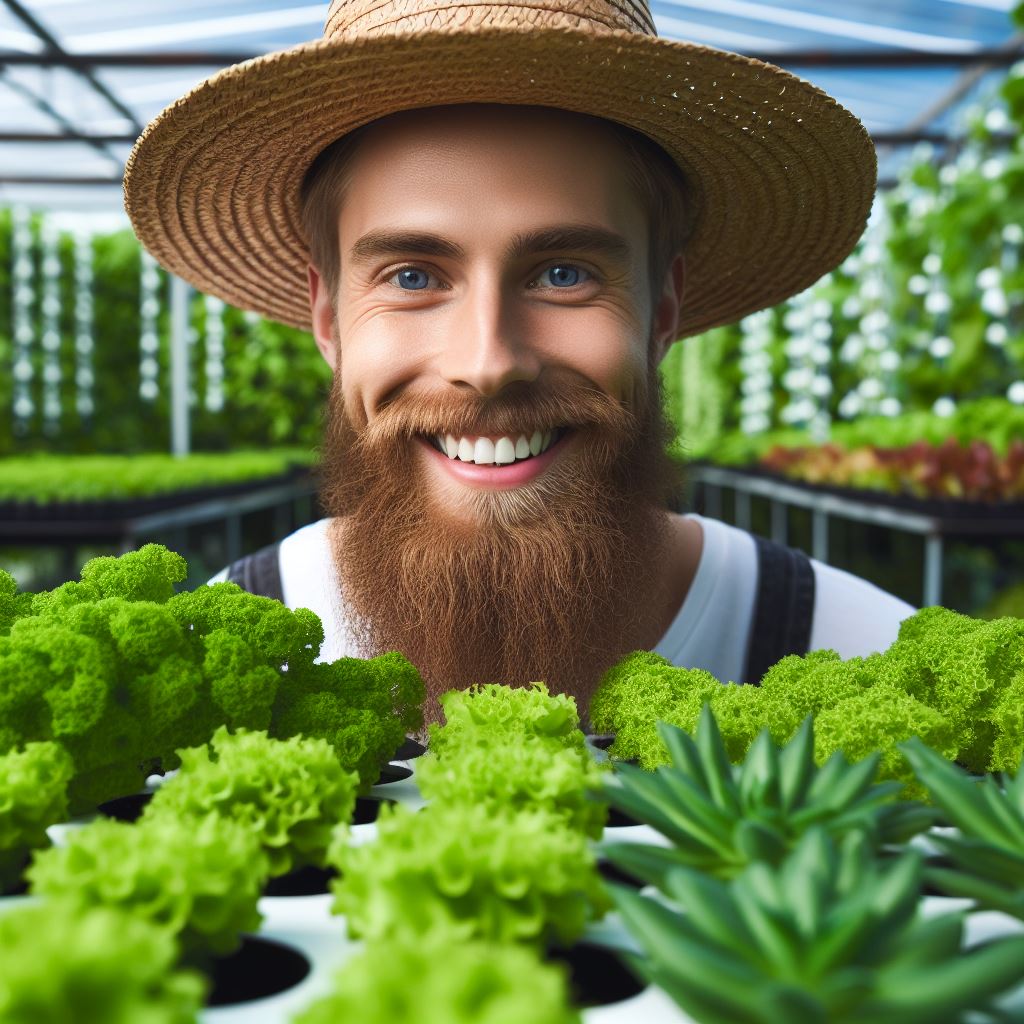Introduction
What hydroponic gardening is
Hydroponic gardening is a method of growing plants without using soil, where the plants are instead grown in nutrient-rich water solutions.
It is a popular technique for urban gardening and indoor farming.
Importance of choosing the right tools for successful hydroponic gardening
Choosing the right tools for successful hydroponic gardening is crucial.
The tools are essential for maintaining the proper environment, ensuring plant health, and maximizing yield.
Specific equipment tailored to hydroponic systems ensures proper nutrient delivery, aeration, and irrigation.
By investing in the right tools, growers can optimize plant growth, minimize issues, and achieve successful harvests in hydroponic environments.
Understanding the basics of hydroponic gardening
Growing plants without soil might sound like a bizarre concept, but it is the essence of hydroponic gardening.
This innovative method of cultivating plants has gained popularity in recent years due to its numerous advantages.
Advantages and benefits of hydroponic gardening
Efficient use of water
Hydroponic systems use significantly less water compared to traditional soil-based gardening.
The water is recirculated within the system, reducing water waste.
Faster growth
Plants grown hydroponically tend to grow faster than their soil-based counterparts.
This is because they receive optimal nutrients directly to their roots.
Year-round cultivation
With hydroponics, you can grow plants all year round regardless of weather conditions.
This allows for a consistent supply of fresh produce.
Space-saving
Hydroponic systems take up less space than traditional gardens since plants can be grown vertically.
Transform Your Agribusiness
Unlock your farm's potential with expert advice tailored to your needs. Get actionable steps that drive real results.
Get StartedThis is especially beneficial for urban areas with limited space.
No weeds or pests
Without soil, there is no need to worry about weeds or soil-borne pests.
This eliminates the need for pesticides, making it an eco-friendly option.
Greater control over nutrient levels
In hydroponics, growers have complete control over the nutrient levels provided to the plants.
This ensures optimized growth and healthier plants.
Higher yields
Due to the controlled growing environment and optimal nutrient supply, hydroponic gardens often produce higher yields compared to soil-based methods.
Now that you understand the benefits of hydroponic gardening, let’s delve deeper into the concept of growing plants without soil.
Hydroponics involves growing plants in a nutrient-rich water solution instead of traditional soil.
The plants are usually supported by an inert medium like perlite, coco coir, or rockwool.
This medium provides stability for the roots while allowing them access to the nutrient solution.
The plants’ roots absorb the necessary nutrients directly from the water solution, eliminating the need for the extensive root systems seen in traditional gardens.
This efficient nutrient delivery system allows plants to grow faster and healthier.
In hydroponic systems, the water solution is carefully balanced with essential nutrients required for plant growth.
This precise control over nutrient levels ensures that plants receive the exact nutrients they need at each stage of growth.
One of the key advantages of hydroponics is the ability to grow plants in a controlled environment.
Temperature, humidity, light, and nutrient supply can all be adjusted to create optimal growing conditions.
This allows for year-round cultivation and the ability to grow a wide range of crops regardless of external factors.
Hydroponic gardening is also a sustainable choice.
The efficient water usage and elimination of pesticides contribute to environmental conservation.
Additionally, by growing your own produce, you reduce your carbon footprint by minimizing transportation and packaging.
Generally, hydroponic gardening offers numerous advantages over traditional soil-based methods.
From efficient water usage to faster growth and higher yields, this innovative technique is revolutionizing the way we grow plants.
Whether you are a commercial farmer or an urban gardener, hydroponics provides a sustainable and efficient solution to meet your gardening needs.
Read: Companion Planting to Deter Pests
Showcase Your Farming Business
Publish your professional farming services profile on our blog for a one-time fee of $200 and reach a dedicated audience of farmers and agribusiness owners.
Publish Your ProfileEssential tools for hydroponic gardening
In hydroponic gardening, having the right tools is essential for successful and efficient cultivation.
These tools not only help in maintaining nutrient levels but also provide proper lighting and ventilation.
Let’s explore the essential tools for hydroponic gardening:
pH and EC meters
These tools are crucial for monitoring and maintaining nutrient levels in the water.
pH meters measure the acidity or alkalinity of the solution, while EC meters measure electrical conductivity to assess nutrient concentration.
Nutrient solutions
There are different types of nutrient solutions available, each with its own role in providing essential minerals and nutrients to the plants.
These solutions help in maintaining optimum plant growth and development.
Growing medium options
Various growing medium options can be used in hydroponic gardening.
Some popular options include rockwool, coco coir, and perlite.
Each medium has its benefits, such as providing sufficient moisture retention and adequate root support.
Lighting systems
Proper lighting is crucial for hydroponic plants as they don’t receive natural sunlight.
Different types of lights, such as LED, fluorescent, and HID, are suitable for hydroponic gardening.
Consider the pros and cons of each type before making a choice.
Ventilation and air circulation
Maintaining proper airflow is vital in hydroponic gardens to prevent the buildup of heat and humidity.
Good ventilation helps in preventing diseases and mold growth, ensuring healthy plants.
Water pumps and timers
Water circulation and irrigation control are essential for hydroponic systems.
Water pumps help in circulating the nutrient solution, ensuring that every plant receives an adequate supply.
Timers allow for precise control of irrigation schedules.
By having these essential tools, you can create an optimal environment for your hydroponic garden.
Remember to choose tools that fit your specific needs and the size of your hydroponic setup.
Now, let’s dive deeper into each tool and explore their specific benefits:
pH and EC meters
These meters allow you to monitor the nutrient levels accurately.
By maintaining the right pH level, you ensure that plants can absorb nutrients effectively.
Similarly, monitoring EC levels helps avoid nutrient imbalances.
Nutrient solutions
Different plants have varying nutrient requirements.
Having a range of nutrient solutions will allow you to cater to specific needs during different stages of plant growth.
Customizing nutrient solutions leads to healthier and more productive plants.
Growing medium options
Choosing the right growing medium is crucial for plant growth.
Rockwool, for example, provides excellent water retention while allowing sufficient oxygen flow to the roots.
Coco coir is a sustainable choice that retains moisture well and enhances root development.
Perlite, on the other hand, improves drainage and prevents waterlogging.
Lighting systems
Lighting is one of the most critical factors in hydroponic gardening.
LED lights are energy-efficient and have a long lifespan, making them ideal for indoor gardens.
Fluorescent lights are affordable and suitable for seedlings and vegetative growth.
HID lights deliver intense light output but generate more heat.
Ventilation and air circulation
Proper airflow prevents the buildup of heat, humidity, and stagnant air, which can lead to the development of diseases and pests.
Installing exhaust fans, intake vents, and circulation fans helps maintain a well-ventilated environment, promoting optimal plant growth.
Water pumps and timers
Water circulation is essential to deliver nutrients evenly to plants.
Water pumps ensure proper circulation, preventing nutrient stagnation and maintaining oxygen levels.
Timers automate irrigation schedules, ensuring plants receive water at the right intervals, promoting healthier root development.
Showcase Your Farming Business
Publish your professional farming services profile on our blog for a one-time fee of $200 and reach a dedicated audience of farmers and agribusiness owners.
Publish Your ProfileInvesting in these essential tools will set you on the path to successful hydroponic gardening.
Each tool plays a crucial role in creating a controlled and optimized environment for your plants, resulting in healthier and more abundant harvests.
So choose wisely, and enjoy reaping the benefits of your hydroponic garden!
Read: Urban Green Thumbs: Saving Water in Style
Factors to consider when choosing tools for hydroponic gardening
Space Requirements
The size and layout of the garden determine the suitable tools.
When planning for a hydroponic garden, it is crucial to consider the available space.
Different tools have varying space requirements.
For instance, larger systems may require more room for installation and maintenance.
Additionally, the layout of the garden should be taken into account, ensuring that the tools can be easily integrated into the design for optimum efficiency.
Budget
Budget is an important consideration when choosing tools for hydroponic gardening.
Various options are available in different price ranges, ensuring that there is something to suit every budget.
While some tools may be more expensive, they may also offer additional features and advantages.
It is essential to compare prices and research thoroughly to make an informed decision.
Plant Type and Size
Different plants have varying requirements, such as nutrient intake, light exposure, and support structures.
When choosing tools for hydroponic gardening, it is important to consider the specific needs of the plants being grown.
For example, certain types of plants may require specialized nutrient delivery systems, while others may need trellises or stakes for support and growth.
Matching the tools with the specific plant requirements ensures optimal growth and productivity.
Energy Consumption
Energy consumption is an important factor to consider when choosing tools for hydroponic gardening.
Tools such as pumps, lights, and heaters can consume a significant amount of energy, impacting overall operating costs.
It is advisable to compare the energy efficiency ratings of different tools and choose those that offer lower energy consumption without compromising performance.
This not only reduces costs but also minimizes the environmental impact of the garden.
Noise Level
Some tools utilized in hydroponic gardening, such as air pumps, may produce noise during operation.
This can be a concern, especially if the garden is located in a residential area or near living spaces.
It is important to consider the noise level of the tools and choose those that produce minimal sound disturbances.
Additionally, proper placement and insulation can also help reduce noise levels.
Essentially, choosing the right tools for hydroponic gardening is essential for success.
Factors such as space requirements, budget, plant type and size, energy consumption, and noise level should be carefully considered.
By taking these factors into account and making informed decisions, hydroponic gardeners can create an efficient, productive, and sustainable gardening system.
Read: Neem Oil: A Gardener’s Best Friend

Recommendations and tips for selecting the right tools
When it comes to hydroponic gardening, choosing the right tools is crucial for success.
Here are some recommendations and tips to help you make the best choices:
Research and gather information about specific products before buying
Before purchasing any tools for your hydroponic setup, it is essential to do thorough research.
Look for different options available in the market and gather information about their features, quality, and suitability for your gardening needs.
This will help you make an informed decision.
Consider reviews and recommendations from experienced hydroponic gardeners
One of the best ways to know if a particular tool is worth investing in is by considering reviews and recommendations from experienced hydroponic gardeners.
They have hands-on experience using different tools and can provide valuable insights about their performance, durability, and effectiveness.
Seek advice from experts or professionals in hydroponic gardening
If you are new to hydroponic gardening, seeking advice from experts or professionals in the field can be extremely helpful.
They can guide you in selecting the right tools based on your individual requirements, budget, and the specific type of hydroponic system you plan to set up.
Start with essential tools and gradually expand the setup based on experience and needs
It is tempting to buy all the fancy tools available for hydroponic gardening, but it is advisable to start with the essential ones.
Focus on acquiring tools such as pH meters, TDS meters, grow lights, nutrient solutions, and growing medium.
Showcase Your Farming Business
Publish your professional farming services profile on our blog for a one-time fee of $200 and reach a dedicated audience of farmers and agribusiness owners.
Publish Your ProfileAs you gain experience and understand your needs better, you can gradually add more tools to enhance your setup.
Regular maintenance and proper cleaning of tools for longevity and efficiency
To ensure the longevity and efficiency of your hydroponic gardening tools, it is vital to follow a regular maintenance routine.
Clean your tools after each use to prevent any build-up of residue or contaminants.
Regularly check for any damages and make necessary repairs or replacements to keep them in good working condition.
By following these recommendations and tips, you can select the right tools for your hydroponic gardening journey.
Remember, making informed choices and investing in high-quality tools will contribute to the success of your hydroponic garden.
Read: Gardening in Drought: Tips for Water Economy
Conclusion
Recap the importance of selecting the right tools for hydroponic gardening success
Overall, choosing the right tools for hydroponic gardening is crucial for achieving success in this method.
By carefully considering your specific needs and budget, you can make informed tool choices.
It is important to emphasize the potential benefits of hydroponic gardening when using the right tools.
These benefits include increased yield, faster growth, and the ability to grow plants in limited spaces.
Encouragement
Ultimately, selecting the appropriate tools for hydroponic gardening sets the foundation for a thriving and efficient garden.
Whether you are a beginner or an experienced gardener, investing in quality tools will enhance your overall hydroponic gardening experience.
Remember to research and compare different tools available in the market.
Consider factors such as durability, ease of use, and functionality.
It is essential to choose tools that are designed specifically for hydroponic gardening to ensure optimal results.
The potential benefits of hydroponic gardening
By making the right tool choices, you can save time, effort, and resources in the long run.
With the right tools in hand, you will be well-equipped to overcome any challenges and enjoy the bountiful rewards of hydroponic gardening.
So, take the time to assess your needs, set a budget, and invest in the right tools. Your hydroponic garden will thank you for it!




